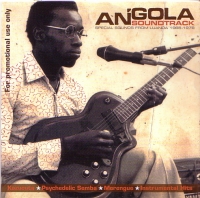 Much in the same way that the Next Stop...Soweto series re-shifted emphasis to the pre-'80s era of South African compilations, Angola Soundtrack seeks to redress the near-complete absence of any form of survey of the former Portuguese colony’s music scene in over a decade. Sure, Luaka Bop put out the respectable Afropea: Telling Stories To The Sea in 1995, which helped to spread the word about artists like Bonga, Waldemar Bastos, and the 'barefoot diva' Cesaria Evora, but in the years since then, collectors of African music have become less interested in the slick studio productions of the '90s and more drawn to the sounds of the classic period of the late '60s and early '70s. No surprise, then, that Analog Africa has stepped up with another platter, holding an edge over their competition by revealing an underrepresented corner of the continent, and not simply cranking out yet another Nigerian or Ghanaian comp (though that’s not necessarily a bad thing!).
Much in the same way that the Next Stop...Soweto series re-shifted emphasis to the pre-'80s era of South African compilations, Angola Soundtrack seeks to redress the near-complete absence of any form of survey of the former Portuguese colony’s music scene in over a decade. Sure, Luaka Bop put out the respectable Afropea: Telling Stories To The Sea in 1995, which helped to spread the word about artists like Bonga, Waldemar Bastos, and the 'barefoot diva' Cesaria Evora, but in the years since then, collectors of African music have become less interested in the slick studio productions of the '90s and more drawn to the sounds of the classic period of the late '60s and early '70s. No surprise, then, that Analog Africa has stepped up with another platter, holding an edge over their competition by revealing an underrepresented corner of the continent, and not simply cranking out yet another Nigerian or Ghanaian comp (though that’s not necessarily a bad thing!).
Similar to what was happening elsewhere in Africa, Angolans in the period covered by this set were concerned with gaining independence from their colonizers, asserting their African-ness while showing their with-it-ness by taking traditional sounds and instruments and combining them with electric guitars, as well as rhythms from both Cuba (“Mi Cantando Para Ti” by N’Goma Jazz being an obvious example) and their colonial Lusophone cousins in Brazil. The influence of the latter can be felt in the near-batucada breakdown on Os Bongos’ “Kazucuta,” a floor-shaker that proves there is more to Angola than the morna (most closely comparable to the Portuguese fado in its minor-key anguish). Os Korimbas also go for the pounding percussion workout with their “Semba Braguez,” semba being an antecedent of the Brazilian samba.
Many of these musicians recorded in local languages instead of Portuguese, describing everyday life while not delving too heavily into politics, even though the country was embroiled in a guerilla war that did not let up until independence was won in 1975. No, the key here is to induce dancing, and in that respect this collection is a total success. As a bonus, compiler Samy Ben Redjeb was able to secure full licensing for all tracks and had access to master tapes, guaranteeing gorgeous fidelity from bassy bottom to shekere-rattling top. The liner notes are among the best the label has penned, combining crate-digging travelogues from Redjeb with historical context from academic Marissa Moorman, along with detailed track-by-track analyses filled with first-hand accounts from the musicians, many of whom contacted Redjeb to tell their stories.
Of all of the African collections put out in 2010, this latecomer is quite possibly the best of the lot!